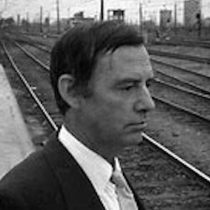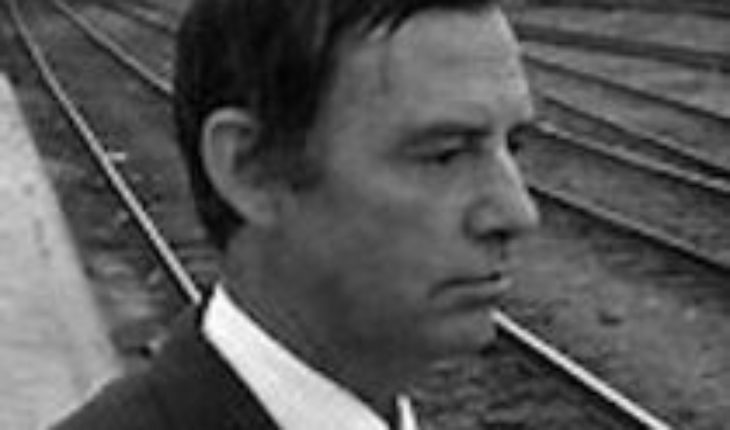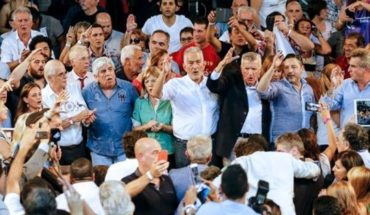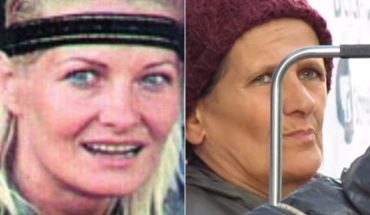
Account of the transfer of The Body of Jorge Teillier from Viña del Sea to the Mill of Ingenio and its private wake.
Around 5:30pm, I arrived at the hotel where Cristina Wenke had stayed part of the time the poet stayed at Gustavo Fricke Hospital, which he had been taken to a week ago, at night, with a heavy hemorrhage. A hunch – or just another gift from the poet – had made me get there (before I thought I’d go straight from Santiago to the Mill of Ingenio, when, going to Viña del Mar, I learned on the radio that Teillier had died) and arrived in time, because Cristina, Rodrigo Miquel, nephew of this, and the sons of Jorge, Carolina and Sebastian, were preparing to transfer the poet to his home of the Mill of Ingenio. The meeting was good and necessary: “They are doing the right thing,” he would have said. Soon, we headed to the funeral home, where only the family of our beloved vate was expected to begin the transfer of his body.
The one-way trip to Ingenio was a few people. It was just the ones I named, plus the chariot driver and me. In this she left Cristina, with her beloved poet. In the car that accompanied them, Carolina, Sebastian, Rodrigo and who writes these lines. We leave Viña del Mar after six o’clock in the afternoon and take the coastal path. There was an atmosphere of gathering, of memories and also of serenity. We were going with the poet back home. The road seemed beautiful to us, especially when we realized that a reddish sun, or strongly orange, with a large presence on the sea horizon, accompanied us. We commented that it was a dignified farewell of the day to Teillier. Sometimes, on some bend of the road, the chariot and the sun remained in the same field of view, and were a perfect complement, a poetic unity, as if the vehicle carrying the poet was going to enter the sun. We rejoice in this sunset farewell of April 22.
The night surprised us by going to the Mill of Ingenio, and Sebastian, who knows of the night sky, showed us some stars and constellations. And Carolina, the moon that also appeared to fire the poet. We got to Ingenio around eight o’clock. The people who work in the house greeted the little entourage with a touching attitude of respect and gathering. The night was intensely starry. We lowered the coffin,” Carolina later remarked, “Everything has been as he would have wanted: the afternoon, the night, and six righteous men to take the coffin,” and we took him to a chapel that had been repaired in the mill itself. That old mill that belonged to the Quintrala, which inspired some poem to more than one poet and the title of a book by Teillier: “The Mill and the Fig tree”, and which is now transformed into a cozy workshop and place of living. Shortly after the poet remained in the chapel, the light mysteriously cut off. We all agreed that it was another of his tricks… The coffin was flanked by candles and flowers: beautiful and aromatized roses, white and red carnations and the headboard, a large bouquet of bougainvilleas. Despite the pain, I perceived an atmosphere of peace. It seemed to me that everyone experienced more of the closeness of the poet than the definitive distance from his death.
That night there were no more people than we had come with him to the Mill of Ingenio, and some of Cristina’s relatives and relatives who later joined: Aída Wenke and her husband, a young pianist daughter-in-law, Gonzalo Miquel and the family friends, Dito and Alina. Late enough in the night, the governor of the province arrived. He expressed the desire of the community of La Ligua to have the poet in the church, to pay homage to him. At about two o’clock at night, or in the early morning, we gathered all those who were at home and read poems by Jorge and commented on him, the life of this “eternal incorrigible” (the expression was lovingly coined by Cristina), the great poet Jorge Teillier. I think he gave us back moments of deep beauty and serenity. If there was sorrow, also communion, peace, intimate dialogue, poetry. I remembered the poet Eduardo Molina Ventura: “Give the dead a pebble, one, / and he will return you to the interior of a mountain.”
The night was passing quickly. Very late, some withdrew to rest, thinking of the days that would come; others remained awake, and there were those who received from that angelic “eternal incorrigible” who preferred anything to “spend their elbows on all the mesons”, those revelations and fullnesses that true poets can bestow.
The day came and Carolina opened all the windows for all the light and with it, the birdsong, the metallic sound of the picaflores, the unmistakable of the thrush and that of the tenca imitators, the greenness and the slight movement of the trees: fig trees, chirimoyos, avocados, alamos, lucumos and others. Dawn greeted the poet.
The morning also passed in the same tone as the night before. Very early, Cristina Wenke took place next to the coffin, where she was most of the day, in an attitude that belongs to those deep, intimate, that we live when we are faced with the death of admired and loved beings. Quietly or speaking in sorine we spent the hours of the bright morning. Around eleven o’clock came a young man who stood for a long time by the coffin. His eyes were watery. Philip, one of those friends-disciples of Jorge Teillier. I was moved by his attitude. I saw him afterwards, quietly walking through the gardens or as a contemplative in the chapel where the poet was watched. Also came the actor Luis Alarcón, who greeted and was short. The atmosphere of privacy remained even that morning, which would not be broken until the poet’s body was left in the church of La Ligua. Gradually the relatives of Jorge came from afar, from the South: his brothers Sara and Fernando, and others.
Some before 3 p.m. a picaflor entered the clear, flowery living room where Jorge was and, although the windows were ajar, there was no way to get him out. A mesh had to be brought and it was not even possible to catch it to release it. It cost a lot of capture, until someone took it as it crashed into the window, at the height of the poet’s body. It is the poetic coincidences, the significant facts, parts of the subtle fabric that poets have taught to see, to reveal while they have lived and that leave us forever discovered when they have already died.
At four o’clock in the afternoon, just at four o’clock in the afternoon, Rodrigo Miquel made the announcement that the float was already ready to move the poet to La Ligua. We took the coffin out of the chapel and took it to the vehicle. There I felt the reality as it was: the poet Teillier was leaving home forever. That’s how we experience it. Worthy and loving cries of his daughter. Everything that happened from now on would already fall into the realm of the public (a poet is also of his people and must be with that, especially a poet who did not shy away from the people). It was a sad journey this time; the previous one had been coming home and this one, leaving home. How to describe that? Trees, many, a way, someone we love weeps… Goodbye to the poet, one of the great and truest and who was among us!
(April 1996)





